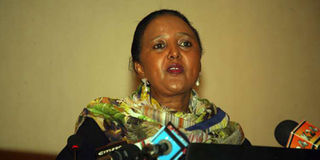AU: Business-first approach key to Africa

Foreign Affairs Cabinet Secretary Amina Mohamed addressing journalists at Intercontinental Hotel in Nairobi on August 18, 2016. Ms Mohamed can help to secure Africa a permanent spot at the top of the table of global business and politics. PHOTO | EVANS HABIL | NATION MEDIA GROUP
What you need to know:
- Her understanding of the catalytic role of business in Africa’s prosperity makes her the choice candidate for the AUC job.
- Putting business first will enable Africa to address the root causes, and not just the symptoms, of the challenges it faces.
With the election of the new African Union Commission (AUC) chairperson just around the corner, Kenya’s Cabinet Secretary for Foreign Affairs and International Trade, Ms Amina Mohamed, has emerged as the leading contender for the position.
There are compelling reasons why Ms Mohamed’s candidacy presents the best value for the continent’s 1.2 billion people.
Besides her stellar credentials as a career diplomat, her understanding of the catalytic role of business in Africa’s prosperity makes her the choice candidate for the AUC job.
In her manifesto, she promises that she will put business at the center of AU policy.
Ms Mohamed’s business-first approach is the silver bullet for Africa’s challenges.
Business is what will drive the highly anticipated African renaissance and set the stage for the realisation of the ambitious goals envisioned under Agenda 2063, which is the continent’s political and socio-economic development blueprint.
Admittedly, prioritising business may on the face of it imply that Africa’s economic and commercial interests prevail over other equally important interests such as social justice, armed conflict, security, and good governance.
Nothing however could be farther from the truth.
Business does not relegate these other issues to the back-burner, but rather, provides permanent solutions to them.
Putting business first will enable Africa to address the root causes, and not just the symptoms, of the challenges it faces.
At the root of hot-button issues such as illegal immigration to Europe, armed conflict and social upheaval is the scarcity of jobs and widespread poverty.
JOB CREATION
As the first woman to chair the general council at the World Trade Organisation (WTO), Ms Mohamed gained an appreciation of the inherent power of trade and the private sector to drive economic growth, create employment and stamp out poverty.
It is no surprise, then, that business has a preeminent place in her overall strategy for the continent.
Furthermore, job creation, which is something that private businesses typically do better than government, is crucial for Africa’s growing youth population.
Africa has the youngest population in the world.
Creating jobs will enable the continent to reap this demographic dividend.
Jobs will also preempt the risks associated with a large pool of unemployed youth, including armed conflicts, and increased migration overseas.
Jobs and economic growth will combat the root causes of migration so that people see prospects for staying in Africa instead of making the dangerous voyage to Europe across the Mediterranean Sea, where an unprecedented 2,809 refugees and migrants died in the open sea in 2016.
Key areas that she plans to focus on, and which I believe will have a positive impact on the fortunes of African businesses, are integration and intra-African trade, including the conclusion of the Continental Free Trade Area negotiations and peace.
THE SOLUTION
Others are promotion of democracy and rule of law, and a Smart Africa, whose growth is underpinned by advancements in ICT; and infrastructure development.
She states that if elected the AUC chair, she will oversee a “revolution of infrastructure within the continent”. This is long overdue.
The continent’s infrastructure deficit has reduced Africa’s global competitiveness by about 40 per cent and further reduced its annual growth rate by about three percentage points, according to the World Bank.
Fast-tracked infrastructure development, will help put African growth back on track and set the stage for increased intra-African trade and faster regional integration.
The continent needs to pull together and wage a united battle against common enemies such as terrorism, corruption and bad governance.
Simply put, Ms Mohamed can help to secure Africa a permanent spot at the top of the table of global business and politics.
Mr Kittony is the national chairman of the Kenya National Chamber of Commerce and Industry (KNCCI)




